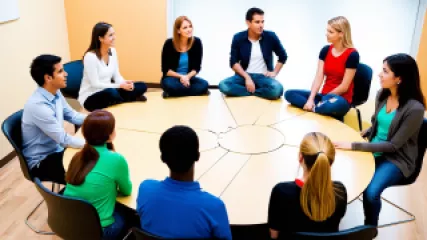10 Best Social Skills Group Therapy Exercises
10 Best Social Skills Group Therapy Exercises
Building strong social skills is crucial for personal and professional growth, but it can be a daunting task, especially for those who struggle with social anxiety or introversion. Fortunately, social skills group therapy can provide a supportive and collaborative environment to help individuals develop and enhance their communication, empathy, and interpersonal abilities. In this comprehensive list, we'll explore 10 of the best social skills group therapy exercises that can help you unlock your full social potential.
1. Icebreaker Activities
Icebreaker activities are a great way to start a social skills group therapy session, as they help participants feel more comfortable and engaged with one another. These exercises can include simple introductions, sharing personal interests or experiences, or engaging in fun, low-stakes activities that encourage group interaction. Examples of effective icebreakers include "Two Truths and a Lie," "Scavenger Hunt," or "Would You Rather?" questions.
2. Active Listening Practice
Effective listening is a crucial social skill, and group therapy sessions can provide an excellent opportunity to hone this ability. Participants can practice active listening by taking turns sharing personal stories or experiences, while their peers focus on maintaining eye contact, asking thoughtful questions, and reflecting back the key points they've heard. This exercise helps individuals develop empathy, attentiveness, and the ability to engage in meaningful conversations.
3. Nonverbal Communication Exercises
Nonverbal communication, such as body language, facial expressions, and tone of voice, plays a significant role in social interactions. Group therapy exercises that focus on nonverbal communication can help participants become more aware of their own nonverbal cues and learn to interpret those of others. Activities like "Mirroring," where partners mirror each other's movements, or "Emotional Charades," where participants act out different emotions, can be particularly effective in this regard.
4. Conflict Resolution Role-Play
Navigating conflicts and resolving interpersonal issues is an essential social skill. Group therapy can provide a safe space for participants to practice conflict resolution through role-playing exercises. Scenarios can range from minor disagreements to more complex conflicts, and participants can take turns playing different roles, such as the aggressor, the mediator, or the peacekeeper. This exercise helps individuals develop problem-solving skills, emotional regulation, and the ability to communicate effectively during challenging situations.
5. Assertiveness Training
Assertiveness is a crucial social skill that allows individuals to express their needs, opinions, and boundaries in a respectful and constructive manner. Group therapy exercises that focus on assertiveness training can include practicing "I-statements," learning to say "no" effectively, and role-playing assertive communication in various social settings. These activities help participants develop the confidence and self-awareness needed to advocate for themselves while maintaining healthy relationships.
6. Empathy Building Activities
Empathy, the ability to understand and share the feelings of others, is a cornerstone of effective social interaction. Group therapy exercises that promote empathy can include perspective-taking activities, where participants attempt to understand and articulate the thoughts and emotions of their peers, or "Feelings Charades," where individuals act out different emotional states for the group to identify. By cultivating empathy, participants can improve their ability to connect with others and respond with compassion.
7. Social Problem-Solving Scenarios
Real-world social situations can often present challenges that require problem-solving skills. Group therapy exercises can simulate these scenarios, providing participants with opportunities to practice identifying issues, generating possible solutions, and considering the potential consequences of their actions. Examples of social problem-solving exercises include "What Would You Do?" scenarios or group discussions around navigating difficult social interactions.
8. Conversation Starters and Small Talk Practice
Initiating and sustaining conversations is a vital social skill, but one that can be particularly challenging for some individuals. Group therapy sessions can offer a supportive environment for participants to practice conversation starters, active listening, and engaging in small talk. Exercises might include role-playing introductions, discussing current events or shared interests, or practicing open-ended questions to keep conversations flowing.
9. Collaborative Problem-Solving Tasks
Effective teamwork and collaboration are essential social skills in both personal and professional settings. Group therapy exercises that involve collaborative problem-solving can help participants develop their ability to work with others, communicate their ideas, and compromise to reach a shared goal. Activities like group puzzles, tower-building challenges, or escape room-style scenarios can encourage participants to practice these valuable skills.
10. Feedback and Reflection
Regularly providing and receiving feedback is a crucial aspect of social skills development. Group therapy sessions can offer a safe and supportive environment for participants to give and receive constructive feedback on their communication styles, interpersonal behaviors, and progress throughout the program. This exercise not only helps individuals identify areas for improvement but also fosters a sense of accountability and growth within the group.
By incorporating these 10 social skills group therapy exercises, individuals can unlock a deeper understanding of their own communication strengths and weaknesses, while also developing the confidence and tools needed to thrive in social settings. Whether you're struggling with shyness, social anxiety, or simply seeking to enhance your interpersonal abilities, these exercises can be invaluable in your journey towards more fulfilling and rewarding social connections.
About the Author
Quintin Bradley is a licensed clinical social worker and the founder of a successful social skills group therapy practice. With over a decade of experience in the field of mental health and personal development, Quintin has dedicated his career to empowering individuals to overcome social challenges and cultivate meaningful relationships. Through his innovative group therapy programs, Quintin has helped countless clients across the spectrum of social skills, from introverts to extroverts, to unlock their full potential and thrive in their personal and professional lives.






